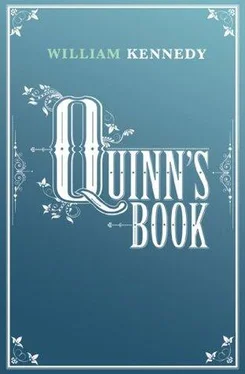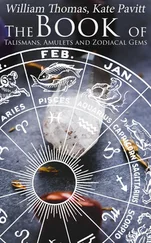We would judge the victory a popular one in this pasture, city, state, nation, and hemisphere, opinions to the contrary notwithstanding. John McGee proved himself a man of grain and grit, and the True Yankee now knows the measure of his own head. For those who wanted more fight, well, more there was — and plenty, too, which the Yankees found to their liking, loving punishment as they do.
A good time was had by all, nobody got killed that we know of, and the nigger carried off John the King on his shoulders.
John McGee, the black man’s burden, retired after this fight, claiming the American championship, and rightly so. He left his Blue Heaven only for occasional trips to Boston, New York, and other centers of manly vice to box with Joshua and a few select sparring mates in exhibitions for the sporting crowd. He was heroized everywhere and he approved of such. But in New York (he once told Joshua) he felt kin to all that he saw: the antlike mob of Irish, the Irish political radicals, the city politicians, the gamblers, the brawlers, the drinkers, and oh, those lovely women.
John always said he retired from fighting for the sake of his nose. “No sensible woman,” he said, “wants a man whose nose is twice as wide as itself, or that travels down his face in two or three assorted directions.”
The power that our hero manifested in galvanizing the attention and loyalty of other men, the magic of his name and fists, generated wisdom of the moment in Manhattan’s Democratic politicians. And so they hired John to round up a few lads and fend off the gangs hired by politicians of the Native American stripe, the most vicious and fearsome of these headed by Bill (The Butcher) Platt, whose method was directness itself: invade the polling places in Democratic strongholds and destroy the ballot boxes. But the presence of the newly fearsome John McGee was a countervailing influence, which by dint of bludgeons, brickbats, and bloody knuckles proved the superiority of several Democratic candidates for public office in the great city.
For his accomplishments John was rewarded with the right to open an illegal gambling house, and assured he need never fear the law as long as there were honest Democratic judges in the world. He began his career with humbleness: three faro tables that catered to gamblers with no money. Perceiving limitations in this arrangement, John persuaded men of foresight to back his expansion, and in a few years owned sixteen gambling hells, including the most luxurious in the city, a Twenty-fourth Street brownstone furnished in high elegance (a taste John had acquired in the mansions of Hillegond and Obadiah), replete with sumptuous dining and endless drink, and featuring a dozen faro tables, two roulette wheels, and private poker salons where John on occasion, or by challenge, played for the house.
I never heard John utter a word on behalf of slaves or against slavery, but as he rose in the world, so did Joshua, working for John as Mick the Rat, as sparring mate, as doorman in the gambling house, and eventually as the most adept of faro dealers, nimble-fingered fleecer of rich men in John’s lush parlors. Joshua did this work when he could, but more than half of his time was spent conducting on the Underground Railroad. By the time the war began he had shunted more than four hundred fugitive slaves toward the North Star. He also owned his own policy house a block away from John’s faro palace on Barclay Street and had four freed slaves working for him, running numbers.
I spent a fair amount of time with Joshua when I moved to New York. After I broke with Maud on that unpleasant night in her dressing room, I suddenly felt stifled by Albany. The year was 1858 and I had sharpened my writing skills to the point that I felt I could function as an independent. Will Canaday promised to print anything I wrote, I made contact with other editors, and so began a life in New York City. My aim was to work at the Tribune for Horace Greeley, a man whose principles seemed as worthy as Will’s, and in time I summoned the courage to present myself and my clippings at his office.
“Your dudgeon is admirable,” he told me, and so I went to work on the greatest newspaper in the metropolis. I wrote first of what I knew well: an interview and reminiscence with John McGee about his great boxing days. I also used John’s connection to gain access to the dominantly Irish gangs of the Five Points section (the Dead Rabbits, the Plug Uglies) and write of their ongoing feud with nativist gangs (the American Guards, the Bowery Boys). This warfare was a constant in the city, as many as eight hundred to a thousand young men in deadly battle in the streets at a given time, and the police helpless to curb it.
I also wrote of Joshua and his former slaves, revealing none of their identities. I printed slave stories as they came out of Joshua’s mouth:
“Slave named Bandy tried to run away and master slit his feet.
“Slave named Mandy lost a plow hook plowin’ and master tied her to a tree and whipped her till blood ran down her toes.
“Slave named Julius was flogged bad for callin’ his master ‘mister.’
“Slave named Pompey worked for a man had a wife wanted a nigger whipped every time she see one.
“Slave named George had a master got hisself into a rage in town, came home drunk and shot George in the foot.
“Slave named Abram got old and useless but master wouldn’t send for no doctor. ‘Let him die,’ said master, and old Abram died with creepers in his legs.
“Slave named Hanson had a master so mean that two hundred lashes was only a promise.
“Slave named Darius, all he lived on for a year was Indian-meal bread and pot liquor off boiled pork.
“Slave named Adam ran away and they caught him and tied him to the ground and whipped him to death.
“Slave named Caroline runnin’ stuff up a hill fell down, got up, kept runnin’, and master whipped her, sayin’, ‘How come you can’t get up that hill faster?’
“Slave named Tucker got punished for goin’ to a church meetin’ at night. Next mornin’ master called Tucker in and whipped him on the head with the butt of the cowhide, got his gun and hit Tucker on the head with the breech, got the fire tongs and hit Tucker on the head with it, got the parlor shovel and beat Tucker on the head with it; then when Tucker went to leave, master got his knife and sliced Tucker across the stomach and hit him on the head with the knife. But Tucker got away holdin’ his guts in, ran and walked sixteen miles and found a doctor, and almost died for five days but didn’t.”
So wrote Quinn.
QUINN, LOOKING STARCHED and fresh in a new shirt and dark-blue dress suit, the only one he owned, wearing also his slouch hat over his day-old haircut, sat in one of the hundred or more rocking chairs on the busy two-hundred-and-fifty-foot porch of the United States Hotel, holding in his lap the Saratoga morning newspaper for today, August 3, 1864, reading a story reprinted from the Tribune about the recent battle at Atlanta, the most disastrous of the war for the rebels: immense slaughter by Sherman’s army. Quinn also read a letter found on a Confederate soldier captured by Grant. The letter was from the man’s brother, a rebel officer, and he wrote: “The capture of Vicksburg and our army last year has proven to be fatal to our cause. We have played a big game and lost. As soon as I am exchanged for a Yankee prisoner I shall leave the Confederacy and the cause for Europe.” And under the headline “Democratic Patriotism” Quinn read: “The Democratic leaders opposed the use of Negro troops as an admission that white men of the North could not vanquish white men of the South. This prevented the raising of many thousand Negro troops. But when the government calls up white men through conscription, the same Democrats strive to defeat it, even inaugurating mobs against it. They won’t let the Negro go, they won’t go themselves, and they claim to be patriotic!”
Читать дальше












